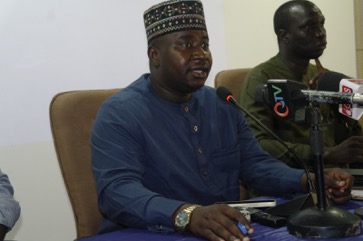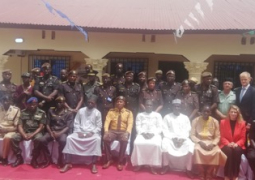
The session was meant to engage lawmakers in frank discussion on issues revolving around Sustainable Financing for Tobacco Control in The Gambia. Besides, the move was also part of a broader initiative designed to update lawmakers on the tobacco situation in the country, challenges faced in terms of financing tobacco-related activities and to galvanise support for more budgetary allocation in anti-tobacco campaign to reduce its burden in the country.
At the event, Billay Tunkara, member for Kantora, who doubles as majority leader, on behalf of both sides of parliament, lauded the move taken by the Ministry especially the NCD unit in raising awareness on the adverse effects of tobacco in the country.
He described the move as timely in view of the fact that lawmakers would soon receive the country’s budget, reminding that there is change in legislation in that the budget will be tabled before them earlier than ever before.
That, he said, would allow them to intensively scrutinise and debate over the budget.
“So, your coming here to enlighten members on the dangers of tobacco and the danger it poses to our society ranging from both firsthand and second-hand smoke and the danger its poses to the country as a whole.”
The Majority leader spoke of their determination to work with the health officials to ensure that there is adequate funding by government towards this laudable campaign, citing the surge in non-communicable disease in the country.
Declaring the forum open, Dr. Momodou T. Nyassi, acting director of Health Services at the Ministry, acknowledged that tobacco use remains one of the leading causes of preventable diseases and mortalities worldwide.
“The economic burden significantly drained our health care systems. Therefore, the financial option of tobacco control remains very significant to protect public health and enhance economic stability and promote wellbeing of people. And all these things cannot be achieved if the National Assembly Members did not take a move to support the initiative.”
Dr. Nyassi also reminded that tobacco also contributes significantly to Non-Communicable Disease in the country, stating that there are so many NCDs, yet they are all preventable.
To reduce the NCD burden in the country, which has both financial and environmental implications, Dr. Nyassi outlined the need for firm and positive actions to reduce the danger it poses to the country.
To that end, Dr. Nyassi called for collective efforts by all to promote the health and wellbeing of Gambians, acknowledging the positive contribution of youth in national development.
He described it as a move in the right direction and called on all to support the initiative.
Presenting on the tobacco situation in the country and the need for sustainable financing, Omar Badjie, programme manager at the Non-Communicable Disease Unit (NCD) of the Ministry of Health, acknowledged that the national prevalence of tobacco use stands at 16.7%.
He said the prevalence shows alarming figures of 31% and 12.8% for male and female respectively, pointing out that an average Gambian male aged 25 to 65 years smoke about 10 sticks of cigarettes.
Badjie also revealed that the use of Shisha is on the increase with about 8.4 % of school children aged 12 – 20 according the Attached 2010 step survey fact sheet.
Commenting on the burden of NCDs in the country, he noted that all households in The Gambia are either directly or indirectly affected with NCDs.
“The burden of NCDs is increasing due to the increase in risk factors and management and treatment is expensive and placing a huge burden on our meager resources.”
The event wrapped with a question-and-answer session during which lawmakers clarified some pertinent issues that are tobacco related.





